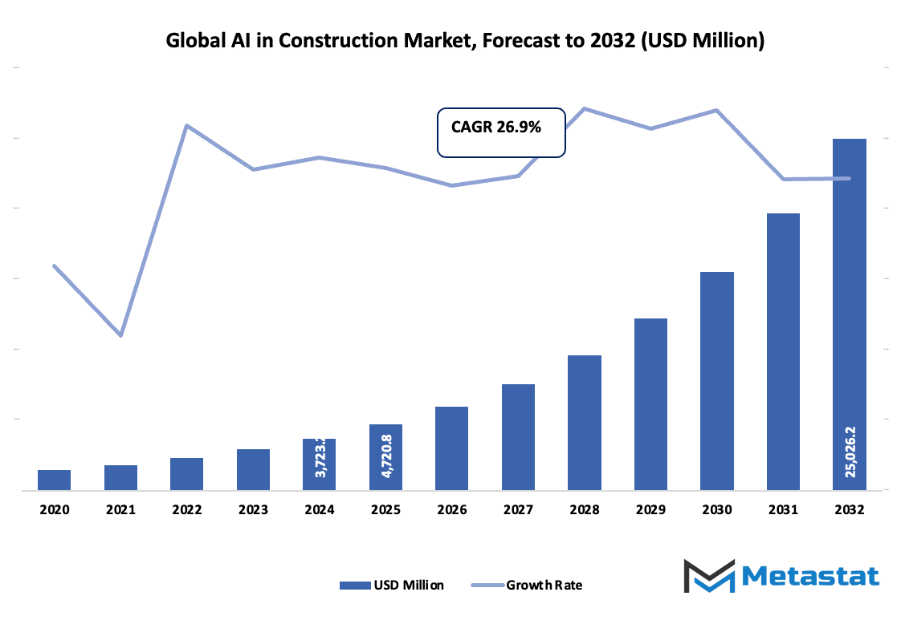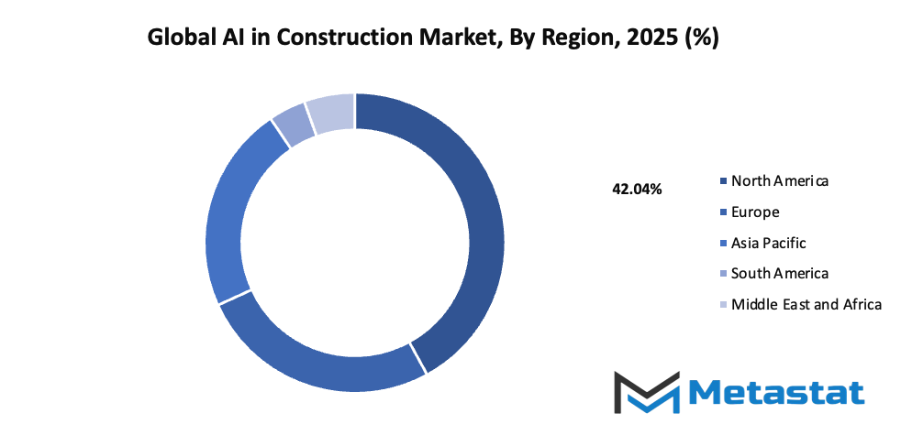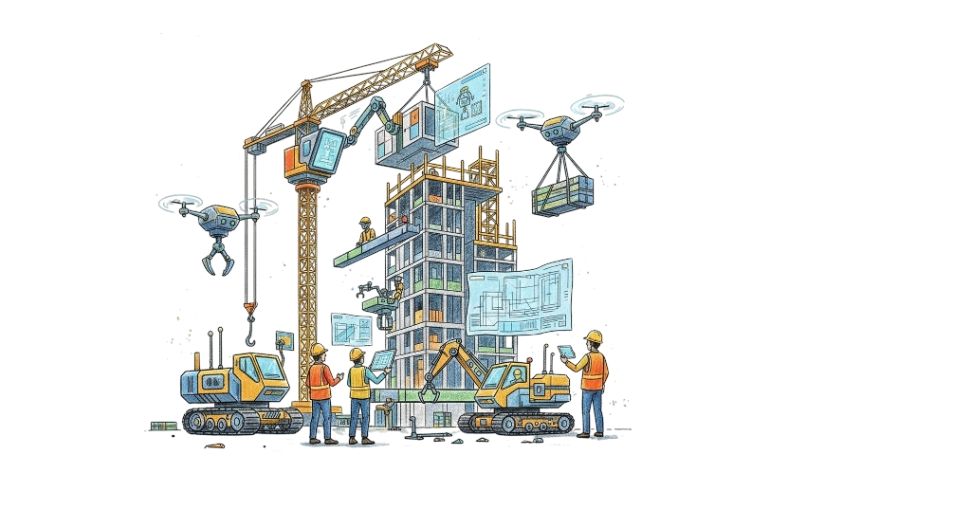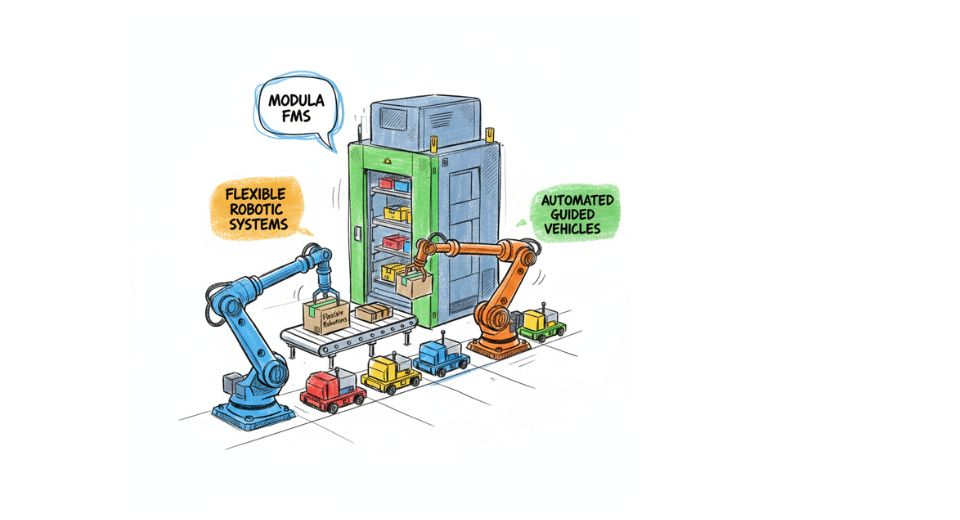Global AI in Construction Market - Comprehensive Data-Driven Market Analysis & Strategic Outlook
The global AI in construction market will experience a revolutionary era in the coming years, reflecting on the integration of advanced technologies into traditional construction processes. The market first began to emerge when construction companies started embracing data-driven devices to enhance project efficiency and reduce costs. Early adoption was gradual, tending to be confined to simple software for project scheduling and resource planning, but it laid the foundation for advanced applications. The first milestone was reached with the deployment of machine learning algorithms that would analyze design plans to anticipate future structural flaws, a change to proactive from reactive construction project management.
- Global AI in construction market value of around USD 4720.8 million in 2025 increasing at a CAGR of around 26.9% from 2032 with the potential to increase beyond USD 25026.2 million.
- Machine Learning and Deep Learning account for almost 93.0% market share, leading to innovation and additional applications through strenuous research.
- Top trends driving growth: Increased demand for productivity and automation on construction sites, Advanced analytics of data to enable predictive maintenance and risk management
- Opportunities are: Intelligent site development in real-time, autonomous equipment, and better decision-making within projects
- Key insight: The industry is set to grow many times in value over the next decade, which means phenomenal growth opportunities.
- As the market evolved, the sector was faced with an era of more experimentation with the imperative to tackle matters of advanced urbanization as well as labor shortages.

Developers and construction companies then began experimenting with autonomous equipment, AI-operated drones, and predictive maintenance software. Regulators slowly followed by releasing guidelines for safe use of AI technologies in construction sites, further stimulating broader experimentation. Public sentiment also turned, with clients insisting on quicker project delivery, cost-efficient, and more environmentally friendly building designs, all of which necessitated firms adapting to AI-driven solutions. The most significant benchmark was crossed when large-scale infrastructure development projects began incorporating AI in real-time monitoring and risk analysis, with measurable gains in terms of efficiency and safety. This was followed by small businesses taking the same approach, leading the market's penetration across geographies. Advances in computer vision, natural language processing, and sensor technologies will further enhance construction workflows to facilitate wiser decision-making and accurate project execution. In the future, the global construction market for ai will reshape construction planning, design, and maintenance to address increasing demand for sustainable solutions and digitalization.
As there is more complexity in cities and greater client expectations, AI-based solutions will deliver invaluable insights, streamline the utilization of resources, and prevent project delays. The market will shift as a natural part of the construction industry, fueled not just by technology itself, but by the interplay of innovation, regulation, and stakeholder demand, and ultimately transforming the way of planning, constructing, and operating infrastructure.
Market Segments
The global AI in construction market is mainly classified based on Technology, Solution, Services, Application.
By Technology is further segmented into:
- Machine Learning and Deep Learning: Machine learning and deep learning will revolutionize construction processes with the ability of systems to handle massive amounts of project data, detect patterns, and provide optimized solutions. The technology will improve the accuracy of planning, decrease errors, and enhance decision-making for intricate construction projects.
- Natural Language Processing (NLP): NLP will be the central component in human language processing and understanding in construction workflows. It will ensure improved communication among a project's stakeholders, less documentation, and automated reporting, which will make managing projects less cumbersome. In the long term, NLP will optimize human interface with AI systems for smoother operations.
By Solution the market is divided into:
- Design and Planning: Design and planning using artificial intelligence will make construction projects efficient and economical. Advanced algorithms will produce the best possible designs, identify possible risks, and allow virtual testing of designs prior to implementation, making construction plans compliant with the requirements and minimizing wastage and delay.
- Revenue Estimation: AI technology will be used to make revenue estimation precise from the analysis of historical project experience, material costs, and industry trends. The same technology will allow construction firms to predict financial results, budget, and make well-informed investment choices, thus achieving better financial management of projects.
- Virtual Assistant: Virtual AI assistants will offer real-time assistance to construction teams. They will respond to questions, manage schedules, and send reminders for important work. Virtual assistants will boost productivity over time, minimize human errors, and enable effective collaboration between off-site and on-site teams.
- Demand Forecasting: AI-based demand forecasting will enable businesses to accurately forecast material and labor requirements of upcoming projects. Backed by historical data and market trends, construction businesses will reduce stock or shortage, meeting resources on time while achieving maximum operating efficiency and cost savings.
- Predictive Maintenance: Predictive maintenance software powered with AI will be used to monitor equipment and machinery in construction for anticipating failure in advance. This will minimize downtime, prolong the life of the equipment, and save money, keeping the project on schedule while avoiding surprise stops in the process of construction.
- Others: Safety monitoring, quality control, and energy management systems are other AI products. The equipment will make construction sustainable and efficient, reduce risks, and enable projects to comply with regulations and enhance overall performance by smart automation.
By Services the market is further divided into:
- Integration and Deployment: AI integration and deployment services will ensure that construction companies adopt AI tools seamlessly. Experts will align technology with project needs, enabling smooth implementation and immediate benefits. This will make AI adoption faster and more effective, increasing the overall efficiency of construction operations.
- Training and Consulting: Training and consulting services will equip teams with the skills needed to use AI effectively. Professionals will provide guidance on best practices, explain system functionalities, and support strategic adoption of AI, helping organizations maximize the value of technology in day-to-day construction management.
- Support and Maintenance: AI support and maintenance services will ensure uninterrupted operation of AI systems. These services will include troubleshooting, updates, and system monitoring, allowing construction companies to focus on project delivery while AI technologies continue to operate efficiently and provide accurate insights.
By Application the global AI in construction market is divided as:
- Asset Management: AI applications in asset management will allow better tracking, utilization, and optimization of construction equipment and resources. Real-time monitoring will reduce downtime, improve resource allocation, and enhance overall efficiency, helping projects maintain timelines and minimize operational costs.
- Project Management: AI in project management will provide tools for scheduling, tracking, and coordinating activities efficiently. By analyzing project data, AI will offer predictive insights, improve collaboration, and help managers make informed decisions to ensure timely completion of complex construction projects.
- Risk Management: AI applications will improve risk management by identifying potential hazards and predicting project uncertainties. By analyzing historical and real-time data, AI will help construction firms mitigate risks, enhance safety, and prevent cost overruns, making projects more secure and predictable.
- Schedule Management: AI-driven schedule management tools will optimize timelines for construction projects. They will analyze dependencies, predict delays, and suggest adjustments, ensuring that tasks are completed efficiently. This will improve resource utilization and reduce the chances of project overruns.
- Supply Chain Management: AI in supply chain management will enhance planning and coordination of materials and logistics. By forecasting demand, monitoring inventory, and optimizing procurement, construction projects will maintain smooth operations, reduce delays, and lower costs associated with supply chain inefficiencies.
- Others: Other AI applications will include quality assurance, safety monitoring, and sustainability analysis. These technologies will support efficient project delivery, maintain high standards, and enable data-driven decision-making, preparing construction projects to meet future challenges effectively.
|
Forecast Period |
2025-2032 |
|
Market Size in 2025 |
$4720.8 Million |
|
Market Size by 2032 |
$25026.2 Million |
|
Growth Rate from 2025 to 2032 |
26.9% |
|
Base Year |
2024 |
|
Regions Covered |
North America, Europe, Asia-Pacific, South America, Middle East & Africa |
By Region:
- Based on geography, the global AI in construction market is divided into North America, Europe, Asia-Pacific, South America, and the Middle East & Africa.
- North America is further divided into the U.S., Canada, and Mexico, whereas Europe consists of the UK, Germany, France, Italy, and the Rest of Europe.
- Asia-Pacific is segmented into India, China, Japan, South Korea, and the Rest of Asia-Pacific.
- The South America region includes Brazil, Argentina, and the Rest of South America, while the Middle East & Africa is categorized into GCC Countries, Egypt, South Africa, and the Rest of the Middle East & Africa.

Growth Drivers
- Increased demand for automation and efficiency in construction projects: Construction projects will require faster and more precise methods to meet tight deadlines and budgets. Automation will help streamline repetitive tasks, reduce human error, and increase overall productivity. Companies will increasingly rely on AI to enhance operational efficiency, improve safety, and manage complex construction activities with greater accuracy.
- Advanced data analytics enabling predictive maintenance and risk management: AI-driven data analytics will allow predictive maintenance of equipment, reducing unexpected breakdowns and costly repairs. Risk management will benefit as AI identifies potential hazards before they occur. Through analyzing historical and real-time data, construction projects will achieve better planning, timely interventions, and safer work environments.
Challenges and Opportunities
- High initial investment and technology adoption costs: Implementing AI solutions in construction will involve significant upfront costs for software, hardware, and system integration. These high investments may limit adoption for smaller companies. However, the long-term benefits, including reduced operational costs and improved project performance, will encourage gradual implementation across the industry.
- Shortage of skilled personnel to implement and manage AI systems: The construction sector will face a gap in trained professionals capable of managing AI technologies. Lack of skilled personnel will slow adoption and integration of AI solutions. This challenge will push companies to focus on specialized training programs and collaborations with technology providers to bridge the skills gap.
Opportunities
- Development of smart construction sites with real-time monitoring, autonomous machinery, and enhanced project decision-making: AI will drive the creation of smart construction sites where real-time monitoring allows for immediate issue resolution. Autonomous machinery will handle complex tasks, reducing reliance on manual labor. AI-based decision-making will improve project planning, resource allocation, and overall efficiency, transforming the way construction projects are managed in the future.
Competitive Landscape & Strategic Insights
The global AI in construction market will continue to experience rapid growth as technology reshapes traditional methods and introduces smarter approaches to project planning, management, and execution. The industry is a mix of international leaders and emerging regional competitors, creating a competitive landscape that demands constant innovation and adaptation. Key players such as Autodesk Inc., SAP, Alice Technologies, IBM Corporation, Oracle Corporation, Microsoft Corporation, eSUB, Building System Planning, Buildots Ltd., and Caidio are setting benchmarks in AI integration, offering tools that improve efficiency, reduce costs, and enhance decision-making processes in construction projects.
Future developments in the global AI in construction market will be shaped by companies that can combine advanced AI capabilities with practical solutions for construction challenges. International leaders are likely to maintain an advantage through extensive research, well-established customer bases, and comprehensive service offerings. At the same time, regional players are expected to gain influence by providing tailored solutions for local markets and responding quickly to emerging trends. The balance between these global and regional forces will define the competitive landscape, with collaboration and strategic partnerships becoming increasingly important.
Strategic insights indicate that companies focusing on predictive analytics, risk assessment, and project automation will likely achieve higher efficiency and project success rates. Innovations in machine learning and data-driven project management will enable better forecasting of project timelines, cost overruns, and resource allocation. Investment in AI-driven construction software and integration with Internet of Things (IoT) devices will further enhance operational accuracy and real-time monitoring. Additionally, companies that emphasize adaptability and continuous technological upgrades will maintain a competitive edge.
From a futuristic perspective, the competitive landscape will shift as AI adoption increases and new technologies emerge. Smaller and agile competitors may disrupt traditional hierarchies by introducing niche innovations or more cost-effective solutions. Companies will need to anticipate changes in global AI in construction market demands, regulatory requirements, and technological advancements to remain relevant. Strategic positioning will focus on delivering measurable results, enhancing project safety, and reducing environmental impact, as construction industries worldwide adopt more sustainable and intelligent practices.
Market size is forecast to rise from USD 4720.8 million in 2025 to over USD 25026.2 million by 2032. AI in Construction will maintain dominance but face growing competition from emerging formats.
In conclusion, the AI in construction market will be driven by both established global leaders and emerging regional innovators. The competitive landscape will reward those who can combine cutting-edge technology with practical solutions, while strategic insights will guide decision-making for efficiency, risk management, and operational excellence. Companies that invest in AI capabilities, maintain flexibility, and anticipate future trends will shape the future of construction, transforming how projects are planned, executed, and maintained on a global scale.
Report Coverage
This research report categorizes the global AI in construction market based on various segments and regions, forecasts revenue growth, and analyzes trends in each submarket. The report analyses the key growth drivers, opportunities, and challenges influencing the global AI in construction market. Recent market developments and competitive strategies such as expansion, type launch, development, partnership, merger, and acquisition have been included to draw the competitive landscape in the market. The report strategically identifies and profiles the key market players and analyses their core competencies in each sub-segment of the global AI in construction market.
AI in Construction Market Key Segments:
By Technology
- Machine Learning and Deep Learning
- Natural Language Processing (NLP)
By Solution
- Design and Planning
- Revenue Estimation
- Virtual Assistant
- Demand Forecasting
- Predictive Maintenance
- Others
By Services
- Integration and Deployment
- Training and Consulting
- Support and Maintenance
By Application
- Asset Management
- Project Management
- Risk Management
- Schedule Management
- Supply Chain Management
- Others
Key Global AI in Construction Industry Players
- Autodesk Inc.
- SAP
- Alice Technologies
- IBM Corporation
- Oracle Corporation
- Microsoft Corporation
- eSUB
- Building System Planning
- Buildots Ltd.
- Caidio
WHAT REPORT PROVIDES
- Full in-depth analysis of the parent Industry
- Important changes in market and its dynamics
- Segmentation details of the market
- Former, on-going, and projected market analysis in terms of volume and value
- Assessment of niche industry developments
- Market share analysis
- Key strategies of major players
- Emerging segments and regional growth potential








 US: +1 3023308252
US: +1 3023308252






